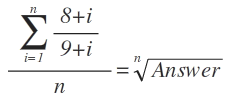How fast can you multiply?
( 1 − 1 0 1 ) ( 1 − 1 1 1 ) ( 1 − 1 2 1 ) ⋯ ( 1 − 1 0 0 1 ) = ?
The answer is 0.09.
This section requires Javascript.
You are seeing this because something didn't load right. We suggest you, (a) try
refreshing the page, (b) enabling javascript if it is disabled on your browser and,
finally, (c)
loading the
non-javascript version of this page
. We're sorry about the hassle.
6 solutions
Aha! On my phone only first three factors are shown, not even any hint regarding how many of them are there, so I was very intrigued when 0.75 turned out to be wrong))
Same here...and couldn't swipe right to extend :(
Same here, I couldn't see the rest. 😂
I too could neither see the question nor get any hint of how many terms were there
( 1 − 1 / 1 0 ) ( 1 − 1 / 1 1 ) ( 1 − 1 / 1 2 ) . . . ( 1 − 1 / 9 9 ) ( 1 − 1 / 1 0 0 ) = ( 1 0 9 ) ( 1 1 1 0 ) ( 1 2 1 1 ) . . . ( 9 9 9 8 ) ( 1 0 0 9 9 ) = 1 0 0 × 9 9 × 9 8 × . . . 1 1 × 1 0 9 9 × 9 8 × 9 7 × . . . 1 0 × 9 = 9 ! 1 0 0 ! 8 ! 9 9 ! = 1 0 0 ! 8 ! 9 9 ! 9 ! = 0 . 0 9
99!9!/100!8! is not correct
the given sequence can be written as:
(9/10)(10/11)(11/12)........(98/99)(99/100)
= 9/100
= 0.09
=(1 - 1/10)(1 - 1/11)(1 - 1/12)...(1 - 1/99)(1 - 1/100) = (9/10)(10/11)(11/12)...(98/99)(99/100) = 9/100 : simplify final answer=0.09
It's a telescopic sequence once simplified.
Another Solution (By using AM-GM inequalities)
let a i = (1- 9 + i 1 ) this simplifies to a i = ( 9 + i 8 + i )
n=91

An informal solution:
Expanding out the expression gives us,
1 0 9 × 1 1 1 0 × ⋯ × 9 9 9 8 × 1 0 0 9 9
After cancellation of like terms, we are left with the answer 1 0 0 9 = 0 . 0 9
The same solution (Presented in a formal manner):
The given product can be expressed and evaluated using product notation as follows:
i = 1 0 ∏ 1 0 0 ( 1 − i 1 ) = i = 1 0 ∏ 1 0 0 ( i i − 1 ) = i = 1 0 ∏ 1 0 0 i i = 1 0 ∏ 1 0 0 ( i − 1 ) = 1 0 0 × i = 1 0 ∏ 9 9 i 9 × i = 1 0 ∏ 9 9 i = 1 0 0 9 = 0 . 0 9